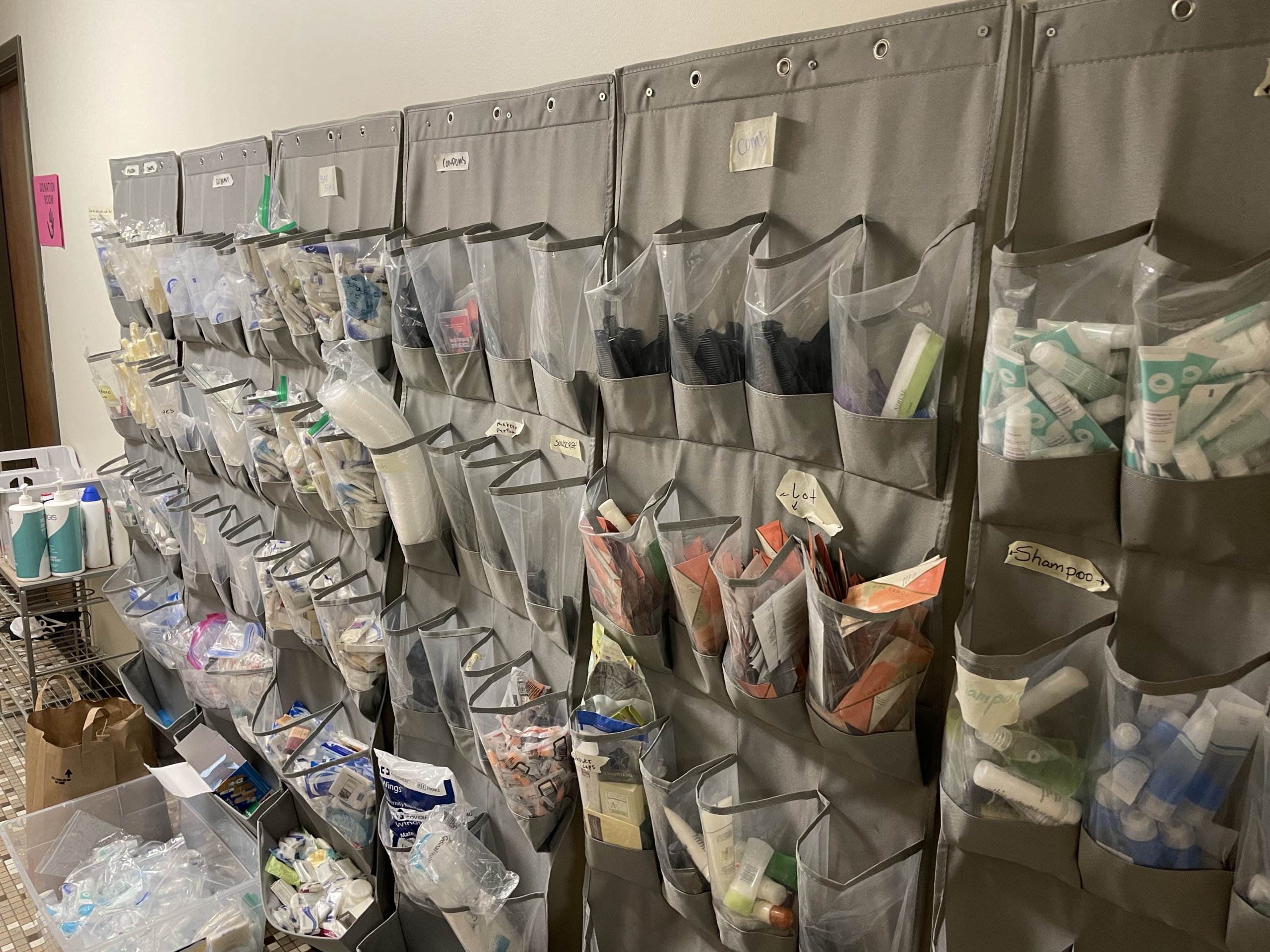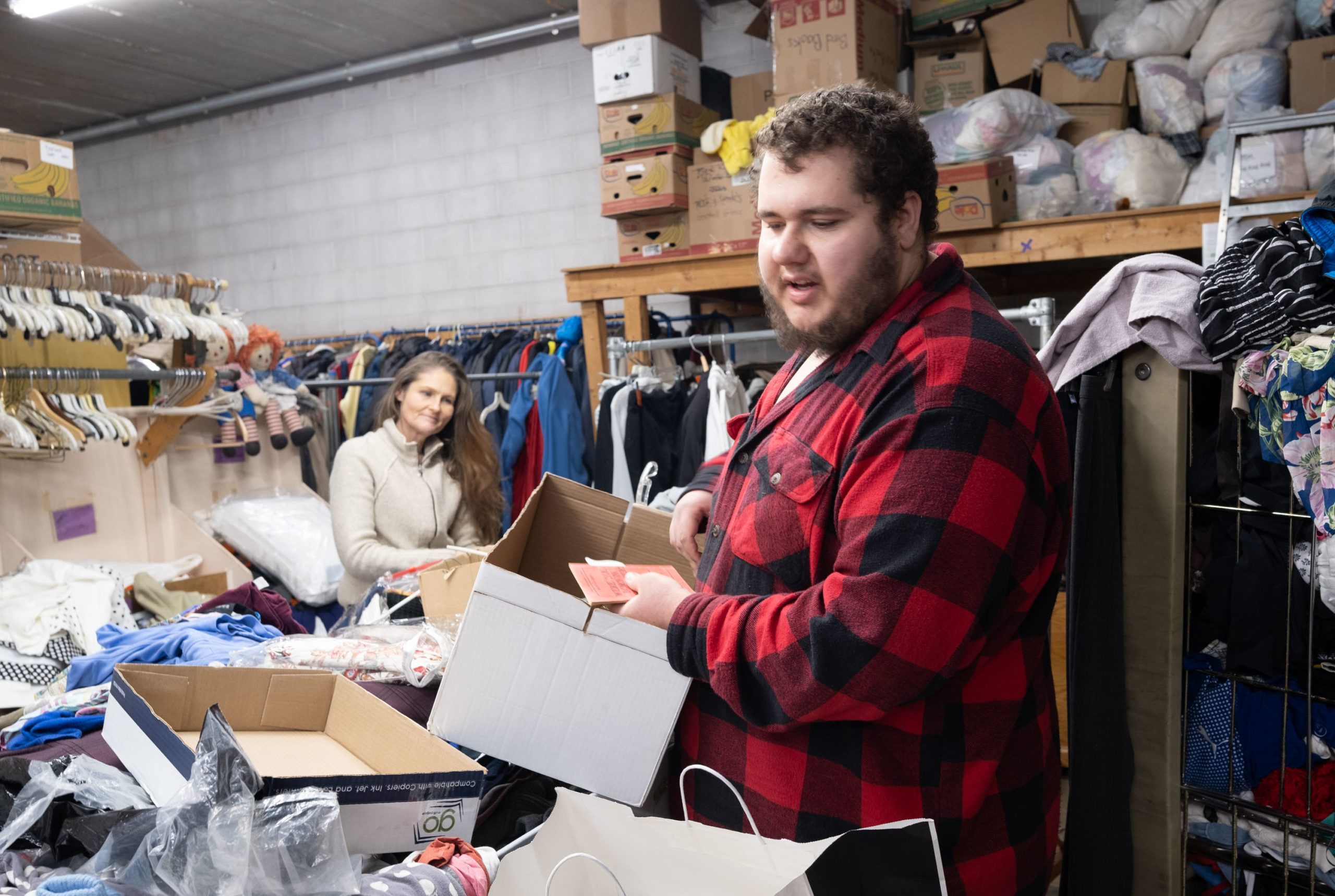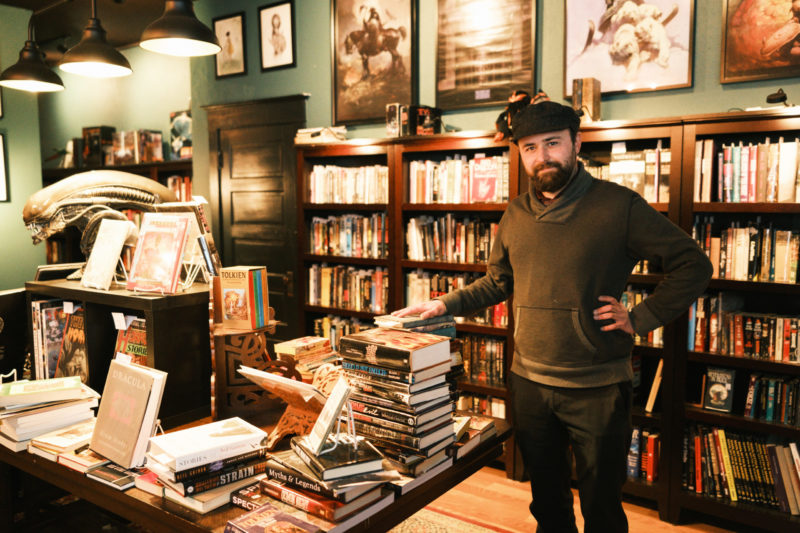Inside Freedom House West 7th’s Daytime Homeless Shelter
Listening House, a nonprofit based in St. Paul that provides hospitality and resources to homeless people during the day, a time when most shelters shut their doors, opened in a new location last January in the St. Paul Fire Department’s “Freedom House” building (296 W. 7th St.)
Molly Jalma, executive director of Listening House, joined the organization in 2020 after working in housing and social services outreach throughout the Twin Cities.
What drove you to get involved in working serving homeless people?
I was a political science major in college, unsure the direction I wanted to take. I had been working part time for a political affairs firm, doing polling and advanced teamwork with organizations like the White House and Secret Service. It was exciting, but I found I didn’t have time for anything else that was important to me, so I decided I wanted to get a job I could punch in and out of while I made up my mind about what I wanted to do with my life. I got a job working the front desk at the Hotel Continental in downtown Minneapolis, which was transitional housing for single adults experiencing homelessness.
That was a transformational experience. I saw that the difference between my situation and the people living there was financial—it was $1,000 to get your car fixed or access to a basement to crash in. Without that help, people often end up homeless. And then everything else slips away. It’s difficult to maintain a sobriety program, for example, or to take your meds, if you don’t have a home. I transitioned after that to working as a property manager for a building called the Archdale which offered services for homeless people and runaway youth, then worked in the disabilities sector. Eventually, I went back to school for a masters in nonprofit management, and I saw how much I liked the business side. I decided I wanted to have a hand in building institutions that were good to work and volunteer at and in making sure nonprofits didn’t fall into traps of paternalism and repeat cycles of white supremacy. I learned from my experience that people need autonomy, they need choices, and it’s not up to people like me to decide what those choices are and how much autonomy you get. I wanted to be a part of a model to help people that could be replicated.
How to you view the role of Listening House in St. Paul?
Showers and sleep are two crucial parts of our role, though there is a lot more to it than that. Many homeless people have overnight jobs, and since shelters typically close during the daytime hours, there isn’t another place for these people to go to sleep and get ready for the next shift. The more places that exist like Listening House, the better off we are. If more places like this opened, the volume and activity would go down here. People come to St. Paul from all over the state and region to get these resources. It would help homeless people enormously if they didn’t need to travel from, say, the town in which they live in South Dakota—or Edina or Bloomington—to the Twin Cities so that they can get a shower, charge their phone, and wash their clothes.
But as essential as the tangible things we offer are—the showers, the food, the coffee, the clothes and laundry machines— they’re all secondary to the human interaction, to looking someone in the eye, remembering their name and asking how they’re doing. We believe in radical hospitality, which means we aim to say yes. We want to take people at their word in a world where they are too often met with distrust and help them problem solve.
There have been residents and local business owners raising voices in recent months about increases in crime in the blocks surrounding the Freedom House location since it opened in January. How do you respond to those complaints, and what should be done about them?
I see those as important concerns. During COVID, the people who were out and about did not have any place to go during the daytime before we were here. For these people, everything is highly visible, everything is public—their relationships, their maladaptive behaviors, any chemical dependency or mental issues they might struggle with. The biggest difference between these people and anyone else is that they don’t have the money to have options to go places. I think some of the concern in the neighborhood was because of seeing an increase in nuisance activity and crime related to the pandemic. What the neighborhood has experienced over the past year may not be an increase in statistics so much as in the visibility of certain behavior, with skyways, fast food restaurants and libraries closed. Obviously, that’s starting to change now, which is a welcome sight for everybody.
I don’t have any criticism for neighbors who are concerned—we all want to live in a place where neighbors are watching out for each other. Homelessness isn’t something that’s comfortable, and it’s okay to find it uncomfortable. People who don’t have enough money or services is not something that anyone wants in their city. We should be able to have enough resources in place to help people, and Freedom House is part of that. There’s no arresting our way out of homelessness. Having chemical dependency or mentally illness or living in extreme poverty are not crimes. And if someone isn’t committing a crime, they’re not going to jail, and if they’re not a threat to themselves or others, they’re not going to be sent to the hospital. The person who’s in the middle of a crisis, maybe they’re loud, maybe they’re standing in traffic. That’s disruptive, and we need to do something. These challenges require additional services—other organizations working to build relationships so that we can get these people inside and places like Listening House where they can get connected to those organizations. Sometimes it takes months for us to develop relationships and earn the trust of vulnerable people. That allows us to make inroads, to talk with a friend I’ve gotten to know for example and say, “Are you sure you don’t want to try a shelter tonight?” Or “Are you sure you don’t want to go to detox and try treatment again?”
We don’t want to have adversaries in the neighborhood, and we want every business to thrive. We want to figure out how we can all coexist. And we think it’s a good thing that people aren’t comfortable with this level of need and homelessness. We shouldn’t be scared, but if we’re comfortable, we’re going to stop looking for solutions.
Sara Fleetham, external relations director at Listening House, joined the organization in January after more than a decade leading nonprofits based in St. Paul.
What do you view as some of the most important resources the Freedom House facility provides?
At the planning commission meeting at the end of May, one of the comments that the Radius case worker made was that Listening House was where they are able to meet clients and give them help. Part of us being here is allowing all the programs who work with homeless people to have a place to meet face-to-face with clients. Ramsey County isn’t meeting face-to-face post-COVID yet. We are one of the only places in St. Paul where case workers can meet with clients privately to do things like chemical dependency or housing assessments. These are the meetings that allow homeless people to ensure they’ve correctly completed applications to get on the housing lists and to see where they are in the queue, to get their meds, to get their paperwork in to get medical assistance or their stimulus checks. We can do this over a cup of coffee and a meal.
How have you worked to manage the challenges of serving a large population of homeless people, many of whom suffer from mental illnesses and other challenges, in this densely populated part of the city?
We have consciously developed our ability to quickly pivot and respond when we encounter issues. One thing we’ve done in recent months to address complaints that business owners have aired is to create a new safety team. Members of this team station themselves on the street outside the building and do rounds of the neighborhood. Just last week, an ally from the apartment building across the street let us know something was going on with someone outside, which hadn’t registered with the front desk yet. So I went out with Rashad, who works at the front desk and helps lead the safety team, and we took care of it. Last night as we were leaving, I noticed some police action, so we took a look at what was going on. It turned out that it was just a car accident, but we wanted to make sure we were there to help in case we could. In the beginning, we needed garbage picked up more frequently and we got a bigger dumpster. Whenever we’ve got something tangible, we’ve built a process that kicks in so that we can jump on it and find a good solution.
Originally from St. Paul, Trina Nunn, Listening House’s program manager, spent her high school years in Texas before returning to Minnesota to earn her undergraduate degree in social services.
What brought you to this work?
It’s been a long journey for me. I started volunteering in high school with the developmentally disabled. My second job was in a group home providing services for young adults dealing with homelessness. I got a degree in social services with an eye toward pursuing a career in direct care. Within a few years, I had worked in almost every area that social services allows: corrections, domestic abuse, sexual assault. My passion continued to grow. Not only did I give back, but I also learned from the individuals I was connected with. Two years ago, I made the transition to working with unsheltered guests, working at a shelter called Safe Space.
What experiences in your day-to-day work at Freedom House have the greatest impact on you?
I had a guest that would come often and generate a lot of complaints. I already knew him and had built a relationship from my prior social services work, so I had a good rapport with him. Metro Transit’s Homeless Action Team (HAT) came in looking for this individual a while back because he had a housing opportunity, and if he didn’t accept it, he was going to lose it. I knew he was out and about, so I tracked him down and coached him into taking this opportunity. We had a great conversation about it, and he’s still there. It’s going well. I continue to check in with him every few weeks.
It is especially rewarding to let the people I work with know that they have a connection with me and are seen for the people they are. Earlier today, I was checking a guest in and because I knew him pretty well, I realized it was his birthday. So I went running after him and found him and wished him a happy birthday. He said, “How’d you know it’s my birthday?” I told him about the big celebration we have on June 30th for people with birthdays in the month.
He said I was the only person who remembered his birthday and asked if he could give me a hug. I said, “of course.” A lot of these people’s information is forgotten, so any little thing you notice has the potential to brighten their day.
The guests here—and even the organization itself—get judged a lot. As the expression goes, you can’t judge a book by it’s cover. I encourage people to open up the book and explore it—get involved if you can—because I can guarantee you, it’s not what many people think.
Bekah Bailey, Listening House’s program specialist, grew up in Minnesota with a deep-seated philosophy about the need to give back, instilled in her by her mother. In addition to managing Listening House programs such as its locker rentals, she works directly with guests to connect them with external programs that provide needed resources.
What is the most surprising part of what you do?
Simply being a stable force, a constant in lives that have too few of them. A lot of homeless people do not have stable situations. It’s incredibly rewarding to know that the people you help every day will return the next day, remember you just as you remember them and look forward to seeing you. For some clients, just seeing someone a few times a week who will remember them by name and the ins-and-outs of what they’re going through is motivation.
How did you decide to work in social services?
I grew up adjacent to unsheltered communities. My mom worked in Anoka County for an organization called Family Promise and her whole life philosophy was that we’d gotten so much from others and we needed to give back. She started me on my first volunteer positions working with unsheltered folks. Out of college, I dove into service work, working with refugee students to do a summer school immersion so they could learn US schooling. When I came back to Minnesota, I wanted something that would keep me tied into the community and allow me to give back in the way that I had been taught to.
Are there any guests that you find yourself thinking about even when you are not working with them?
Many of them, but there is one guest in particular who was looking and looking for jobs for so long, and nothing was working out. I felt terrible. Eventually, he ended up getting one but it was a ten hours on your feet job, which he didn’t have resources for. He didn’t have comfortable shoes, for instance. We connected him with a partner organization and within a week he was hooked up with work shoes, a bus card. He’s had that job for three months now. He comes in from time to time and lets me know how work is going.
Anwar, a guest of Freedom House and frequent volunteer from St. Paul, relies on its services for everything from housing applications to daytime sanctuary.
Of the various resources at the facility, what do you find most valuable?
You get state IDs taken care of, housing taken care of, free food, shower, bed, books, TV. Just having the community is the most important thing, though. I volunteer here, helping to clean tables, sweep floors, and in return they often give me metro tickets to go to work. This is a good place for people that are homeless and don’t have food or a place to take a shower. I used to work a night shift at Polar Plastics, and I needed something like this—a place to sleep during the day and shower—but it didn’t exist. I think they should have places like this all over Minnesota. Other places that serve the homeless could learn a lot from Freedom House—how to treat people with respect and kindness and listen to their needs.
What is the most difficult aspect of surviving as a homeless person for people who have not experienced it to understand?
How difficult every part of your life can become when you do not have a base that you can get to your job from. I was homeless for two-and-a-half years until two weeks ago, but I am not anymore, and already things are much easier. I got a bed in Mary Hall. Before that, one of the issues I was dealing with was finding a place that was accessible to where I needed to be. I wanted to find a place to stay in St. Paul because it is where I work and I love this city. The staff at Freedom House helped me with the paperwork.
I am not a good reader, but I can spend a lot of time with a document and figure out what it means. Some people cannot read or write, and they are never going to be able to fill out an application without help. Without this place, I do not know where I would be. I probably would not have that bed in Mary Hall. I probably would not have a job or food until payday.
Now that you have a home, what keeps you coming to Freedom House?
I love it. It is true that I do not have to come here anymore, but I want to. They keep me occupied and away from danger, away from being locked up or being in trouble with other people. That is why I continue to come. I also come because this is like my second home, my family. They are not going to let anything happen to me, and I am not going to let anything happen to them. I volunteer here because I love it.
Even though I have a place to sleep, I am grateful that Freedom House is here because of the resources it hooks you up with. My phone and wallet got stolen last week. The folks here are helping me get my new state ID, social security card and food stamp card. I can get my own phone back by working, but those government programs are a lot more difficult. There is a ton of paperwork.
At most night shelters, you have to wait until the morning to get resources, and sometimes they do not come through like they are supposed to. You are constantly waiting and waiting. A person gets tired of waiting. At Freedom House, there is not so much waiting. Whatever you need, they get right to it. I am going in to get my state ID tomorrow because of them, and I will have my EBT card by Monday. When I heard that, I felt like I was going to cry. If every place could be like Freedom House, I don’t think we would be in the predicament we’re in.




